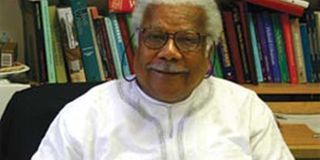Why Mazrui was simply overrated

The late Prof. Ali Mazrui. Mazrui (1933–2014) was an academic colossus whose intellectual brilliance death cannot dim. PHOTO | FILE
What you need to know:
- Mazrui was an epitome of self-togetherness and rhetorical ingenuity, our answer to Cicero.
- Mazrui’s lack of a healthy dose of ironical scepticism towards his homeland, race, and religion followed him to his grave, revealing a person who was not as cosmopolitan as one would desire in a scholar of his stature.
- Be that as it may, Mazrui projected himself as a citizen of the world, the kind of intellectual I strongly believe should have been buried in the country of his death, not his natal home.
Ali Mazrui (1933–2014) was an academic colossus whose intellectual brilliance death cannot dim.
I did not get a chance to talk to Prof Mazrui in person, but I corresponded with him by email (seeking some guidance on the various editions of Nyerere’s translations of Shakespeare), read most of his works (especially those on literature), and sat in a few of his public lectures.
The distinguishing quality of this academic titan was the conviction with which he delivered some of his most controversial positions.
Mazrui was an epitome of self-togetherness and rhetorical ingenuity, our answer to Cicero.
With a good command of the English language and enormous knowledge of global history and local political nuances, the don was impossible to disagree with when he took to the podium.
Maybe a bit of reflection later on would offer some room for criticism, especially because Mazrui tended to deodorise the evils visited upon the black race in the name of Islam or to encourage outlandish ideas like the need for an African atomic bomb.
ENOUGH RESTITUTION
He had his own weaknesses. Trying a little bit too hard to whitewash Arab slavery, Mazrui tended to see Indian Ocean slave trade as less harsh than trans-Atlantic slavery.
To him, Arab slave traders have done enough restitution to enslaved Africans because ...listen to him, a possible beneficiary of slavery...Yasser Arafat and Muammar Gaddafi opposed apartheid and were Nelson Mandela’s buddies. Really?
Mazrui’s defensive personal attacks on Wole Soyinka after Soyinka’s criticism of Mazrui’s The Africans: A Triple Heritage and our Kenyan scholar’s grouse over Henry Louis Gates’s Wonders of the African World betrayed a person who couldn’t take a good intellectual barb in his stride or brook academic competition from intellectuals clearly better trained than him.
For younger scholars, Mazrui belonged to a bygone generation of insufficiently theoretical dons who believed in the infallibility of their creed and were too keen to defend their positions, even if those stances — usually founded on ethnicity, political grandstanding, and religious dogma — could not withstand a modicum of conceptual scrutiny.
Mazrui’s lack of a healthy dose of ironical scepticism towards his homeland, race, and religion followed him to his grave, revealing a person who was not as cosmopolitan as one would desire in a scholar of his stature.
To me, destinations and stopovers are more important than origins. One of Mazrui’s relatives has been quoted in the media saying that the scholar “was approached numerous times by the USA to take up that country’s citizenship, but he turned all of them down, saying he was born a Kenyan and will die a Kenyan.”
Be that as it may, Mazrui projected himself as a citizen of the world, the kind of intellectual I strongly believe should have been buried in the country of his death, not his natal home.
FORMAL AFFLIATION
The money wasted transporting our corpses across oceans and national boundaries when we die outside Kenya can be put to better use (e.g. building a classroom or two in an orphanage).
Unlike Mazrui, I have accepted (without being begged too much) to be one of these human-looking characters I now call my fellow Americans. So I’m not likely to be caught criticising their institutions too loudly these days.
But it is a failure on the part of Kenyan institutions of higher learning that a scholar of Mazrui’s stature died without formal affiliation with Kenyan universities, yet he was the Albert Luthuli Professor-at-Large at the University of Jos in Nigeria, probably because Nigerians respect our intellectuals more than we honour them.
In Uganda, they plan to unveil a Mazrui statue in tribute to a Kenyan don Kenyans themselves don’t care very much about.
Rest in peace, Professor Ali Mazrui.




